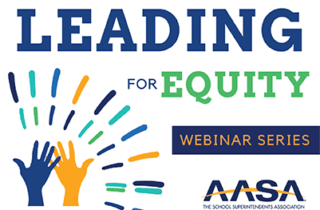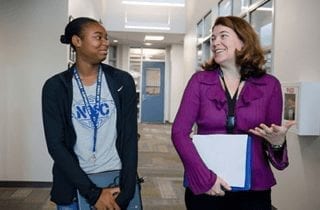Ways to move the process forward, communicate effectively, and achieve meaningful improvements were discussed during a recent edWebinar, hosted by AASA, The School Superintendents Association and AASA’s Leadership Network. The presentation featured Dr. Jeannie Stone, Superintendent of the Richardson Independent School District (TX), Carrie Breedlove, Principal of J.J. Pearce High School (TX), Katrina Collins, Principal of Skyview Elementary School (TX), and Toni Jackson, a teacher at Dartmouth Elementary School (TX).
Equity is one of the most overused terms in education—not just because most can’t agree on a definition, but because the promise of equity is often not backed up by action. In the edWebinar, “Leading for Equity: Intentionality for Access and Opportunity,” hosted by AASA, The Superintendents Association and AASA’s Leadership Network, Dr. Gustavo Balderas, Superintendent of Edmonds School District (WA), and Dr. Heath Morrison, Superintendent of Montgomery Independent School District (TX), discussed how they’ve approached building equity throughout their careers and why acting upon an equity agenda is an urgent, right-now need.
As the COVID-19 crisis has forced schools to close their buildings and move online, inequities in access to technology, books, and even food have become more apparent. Still, there are ways educators can continue to support the learning needs of their full range of students and make the education they provide more equitable. During a recent edWebinar, Cornelius Minor, a Brooklyn-based educator and staff developer, and Dr. Jennifer Williams, a professor at St. Leo University’s College of Education, identified ways that teachers can increase their understanding of equity issues that may affect learning needs, in order to respond with effective solutions.
This edWebinar will help you understand more about what equitable access in reading means for students that have reading deficits, and how it can help you close the achievement gap.
In this edWebinar, hear how new master scheduling can be used to make sure all students participate in college and career readiness.
This edWebinar will provide participants with a step-by-step guide to reimagining your schedule for college and career readiness.
While the Individuals with Disabilities Education Act (IDEA) was last reauthorized in 2004, with amendments in 2015, and the Web Content Accessibility Guidelines (WCAG) were updated back in 2008, the demand for accessibility and equality in education continues to grow. Administrators and teachers, who want to help every child reach their potential, can’t afford to wait for new laws and policies. Educators still need to constantly evaluate the effectiveness of accessibility initiatives, advocate for resources for their students, and anticipate where they need to go next. During the edWebinar “Accessibility: Effective, Equitable Learning Environments for All Students,” which is part of a series hosted by CoSN and edWeb.net, the presenters discussed how they approach CoSN’s five steps to ensure accessibility.
When students don’t perform well in a subject, the typical responses relate to student motivation, e.g., they need more grit, they don’t have the right growth mindset, or they just need to work more effectively. In other words, the student gets the blame. During his presentation, “Promoting Belonging in Math Through Instructional Choices and Practices,” Jamaal Sharif Matthews, Ph.D., Associate Professor at Montclair State University, NJ, shared his research on the role of belonging in school success and how it may be even more substantial for ethnic minority and socially marginalized youth. While his work is primarily centered on mathematics education, Dr. Matthews’ work on building instructional practices to promote belonging can apply across subjects and grade levels.
In this edWebinar, understand the mindsets and practices teachers can develop to promote belonging become proactive in restoring equity in classrooms.
In this edWebinar a school superintendent, a district technology director and a public library director tell how address the challenges of digital equity.









